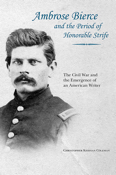Ambrose Bierce and the Period of Honorable Strife
The Civil War and the Emergence of an American Writer

- Author(s): Coleman, Christopher K.
- Series:
- Imprint: University of Tennessee Press
- Publication Date: 2016-09-26
- Status: Active
- Available in Hardcover - Cloth: Price $49.95 | Buy Now
In the spring of 1861, Ambrose Bierce, just shy of nineteen, became Private Bierce of the Ninth Indiana Volunteer Infantry. For the next four years, Bierce marched and fought throughout the western theater of the Civil War. Because of his searing wartime experience, Bierce became a key writer in the history of American literary realism. Scholars have long asserted that there are concrete connections between Bierce’s fiction and his service, but surprisingly no biographer has focused solely on Bierce’s formative Civil War career and made these connections clear.
Christopher K. Coleman uses Ambrose Bierce’s few autobiographical writings about the war and a deep analysis of his fiction to help readers see and feel the muddy, bloody world threatening Bierce and his fellow Civil War soldiers. Across the Tennessee River from the battle of Shiloh, Bierce, who could only hear the battle in the darkness writes, “The death-line was an arc of which the river was the chord.” Ambrose Bierce and the Period of Honorable Strife is a fascinating account of the movements of the Ninth Indiana Regiment—a unit that saw as much action as any through the war—and readers will come to know the men and leaders, the deaths and glories, of this group from its most insightful observer.
Using Bierce’s writings and a detective’s skill to provide a comprehensive view of Bierce’s wartime experience, Coleman creates a vivid portrait of a man and a war. Not simply a tale of one writer’s experience, this meticulously researched book traces the human costs of the Civil War. From small early skirmishes in western Virginia through the horrors of Shiloh to narrowly escaping death from a Confederate sniper’s bullet during the battle of Kennesaw Mountain, Bierce emerges as a writer forged in war, and Coleman’s gripping narrative is a genuine contribution to our understanding of the Western Theater and the development of a protean writer.
